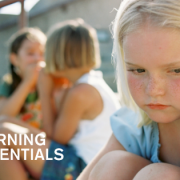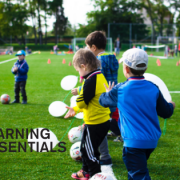No Name-Calling Week: A Teacher’s Approach
Many people are unaware of No Name-Calling Week. To be honest, I did not know about this week-long movement until recently. We educators, however, are all too aware of the name-calling that occurs regularly in our schools.
As a former teacher, I have been privy to the impact that name-calling and other bullying can have on an adolescent. As we’ve all experienced ourselves, when students mature into adults, they become less concerned with how others view them, the names others call them, or any rumors being spread. Thankfully, with age and maturity comes a secure sense of self and disregard for teasing, bullying, etc. For middle schoolers and teens, however, arriving at this notion of self-awareness and confidence can be a rough and seemingly endless road.
As teachers and educators, it is our job to be tuned in to the goings on in our classrooms and hallways. Now more than ever before bullying, whether cyber or otherwise, can have tragic outcomes. It is no longer a case of “toughen up,” “shake it off,” or “pay no mind to what others have to say about you.” Hormones, emotions, and peer pressures have the potential to brew the perfect storm of misery for a bullied teen. With consequences as serious as depression, school violence, and suicide, we cannot simply chalk it up teenagers being teenagers. We cannot simply ask victims to “brush it off.”
Even more difficult sometimes is the fact that adolescents may not come right out and say that they are being bullied. In fact, teens tend to think that “tattling” on the bully will undoubtedly make things worse–which is often the case. A keen awareness can sometimes make all the difference for a teen that is struggling with being bullied. These are some common indicators that a student may be a victim of bullying:
- Unexplainable injuries such as scratches, bruises, etc.
- Frequent health complaints such as headaches or stomach aches
- Sudden loss of friends or avoidance of social situations, refusal to work in groups
- Suddenly feeling sick, faking illness, or asking to go to the nurse regularly
- Changes in eating habits, such as suddenly skipping meals or constantly asking to complete classwork during lunch
- Lethargy, low-energy, or falling asleep in class
- Declining grades, loss of interest in schoolwork, or frequent absences
- Depressed demeanor or frequent crying
- Self-destructive behaviors or mentions of suicide
If you notice some of these signs in a student, make a point to discuss observations of the student with colleagues, guidance counsellors, and other adults. Bullying is often an embarrassing and sensitive point of contention for students–the last thing they may want to do is discuss their personal woes with a teacher. Gather as much information about the student’s behavior trends and peer groups first. Then approach the student or parent if necessary.
Too often, victims of bullying believe that no one notices or cares about their struggles. Teachers can shatter this notion by being a listener, advocate, or disciplinarian if need be in bullying situations.








